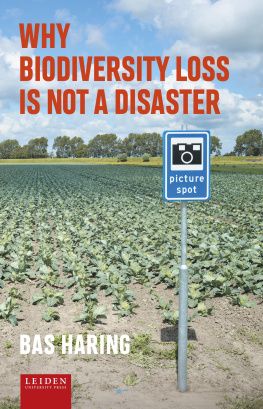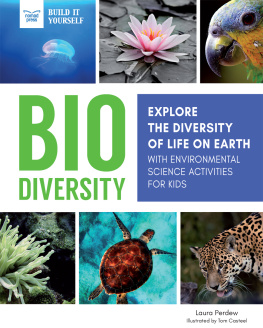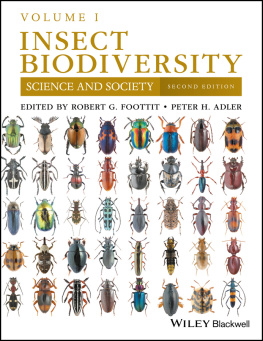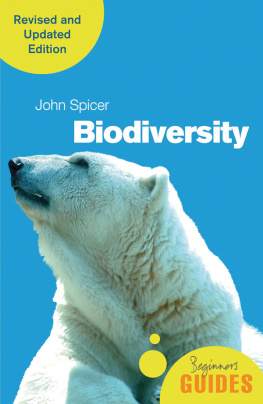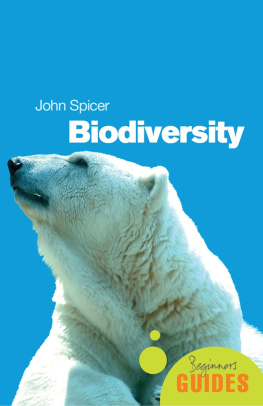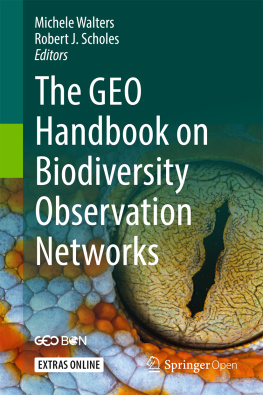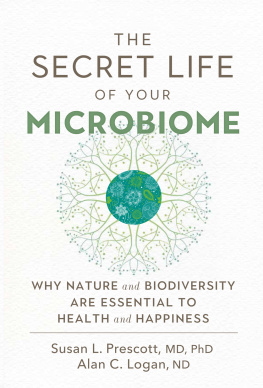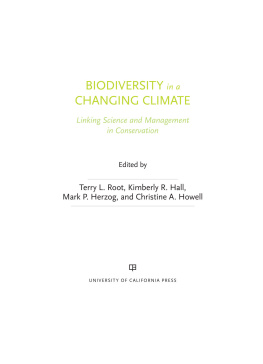Why Biodiversity Loss
Is Not a Disaster
Bas Haring
LEIDEN UNIVERSITY PRESS
More information can be found on www.whybiodiversitylossisnotadisaster.com
Cover design: Andre Klijsen
Cover illustration: foto Henk Wildschut
Lay-out: Crius Group
ISBN 978 90 8728 353 7
e-ISBN 978 94 0060 390 5 (e-PDF)
e-ISBN 978 94 0060 391 2 (e-PUB)
NUR 410, 738
Bas Haring / Leiden University Press, 2020
All rights reserved. Without limiting the rights under copyright reserved above, no part of this book may be reproduced, stored in or introduced into a retrieval system, or transmitted, in any form or by any means (electronic, mechanical, photocopying, recording or otherwise) without the written permission of both the copyright owner and the author of the book.
This book is distributed in North America by the University of Chicago Press
( www.press.uchicago.edu ).
So I guess you are a biologist too?
No, I am a philosopher. But I do like biology.
Then what are you working on here?
I am writing an essay. About biodiversity.
Oh, its very good to give biodiversity some serious thoughts! We all know that biodiversity is very important. But its difficult to argue whats so important about it.
If its difficult to find arguments for its importance, shouldnt you consider the option that its not so important at all?
But?
But what?
We all work on biodiversity. My research is funded because of its relevance. I know biodiversity is important. I just cant explain why.
The above conversation took place in the canteen of the Smithsonian Tropical Research Institute at Barro Colorado Island, Panamaa world-famous heaven for tropical biologywhere I partly wrote this essay.
Table of Contents
1
About Biodiversity and Disasters
Everyone knows that plant and animal species go extinct, and that biodiversity decreases. At a substantial pace. It seems obvious that this loss might have disastrous consequences. Maybe because of a cascading effect well end up in a barren, empty world that contains hardly any nature: an uninhabitable moonscape. And if that doesnt happen, we at the very least depend on biodiversity for our food, health, and well-being. This topic receives a lot of attentionfrom both the media and scienceand usually in an alarming way:
Loss of biodiversity is just as catastrophic as climate change. (Watson, 2019).
And according to the United Nations:
We should be alarmed because [] biodiversity is humanitys source for countless irreplaceable goods and services, including food, lumber, medicine, crop pollination and air and water purification . (UN, 2010)
This suggests that biodiversity loss threatens the continued availability of these necessities.
Maybe the most explicit warning of a disaster to come is from the World Wide Fund for Nature (WWF):
Lose biodiversity and the natural world including the life support systems as we know them will collapse . (WWF, 2016)
I know people who feel seriously worried about such messages, and for whom biodiversity loss is indeed as distressing as climate change. An illustration of such worry is a cartoon by the Canadian artist Graeme MacKay published in the midst of the 2020 coronavirus crisis. The picture shows four successive tsunami waves of increasing size, each representing a serious threat. The first wave, the little one, is the coronavirus itself. The second, larger one represents the economic crisis following the coronavirus crisis. The third one is climate change. And the biggest wave, the fourth one, reads biodiversity collapse. Now its unclear what MacKay exactly means with biodiversity collapse. Is it the collapse of biodiversity itself, or a collapse of something elsecivilization?induced by the loss of biodiversity? But in any case, the size of the wave implies a serious problem. A disaster.
The title of this essay already suggests that I dont see reasons to believe that a disaster is looming.
I didnt write this essay to nag conservationists; I also love nature. Its not my aim to deny disasters or to downplay humankinds impact on the planet, which is often a rather negative impact: like nuclear waste, climate change, and suffering animals in factory farming. Moreover, this negative impact often coincides with biodiversity loss. Chemical pollutionjust an arbitrary exampleis usually bad for nature. However, this doesnt mean that biodiversity loss itself has negative consequences. Thats what this essay is about. Its actually about two questions: (1) Does biodiversity loss cause a disaster? What will be the consequence of further biodiversity loss, and what to think of that? And (2): Is biodiversity loss a disaster? Just by itself, independent of possible consequences.
Biodiversity is a scientific term, and it might seem that biodiversity loss is a disaster is a scientific claim. But that is not so. What happens when biodiversity further decreases is an empirical question that belongs to science. But what to think of that is a value judgement and of a different nature. Science is not about what constitutes a disaster, and what doesnt. That is more a philosophical issue, and moreover one not reserved for specialists. The knowledge of scientists and experts outweighs the knowledge of laypeople, but their value judgement does not. Whether biodiversity loss is a disaster is an issue everyone has a say about.
I think its important to distinguish science from values as much as possible, and at least to make hidden value judgements explicit. Thats why I wrote this essay. The credibility of science is at stake. If no disasters happen, not because of measures taken, and not because scientists were wrong in their predictions, but simply because the things that happen arent disastrous in the eyes of the general public, then science will lose some of its credibility.
Furthermore, I want to provide a little relief to those who worry a lot, and who think that biodiversity loss is as catastrophic as climate change. Such worry is not needed. I really doubt that biodiversity is the appropriate concept to keep in mind if we want to improve the quality of our planet, or if we want to prevent future disasters.
There are various reasons to doubt the supposed disastrousness of biodiversity loss. To begin with, its quite possible that we mistakenly ascribe a purpose to species and biodiversity. All those plant and animal species seem to function for the whole of nature; lose them and the whole machinery stopsor so it seems. But actually, its quite common to see functions and purpose, even when theyre not there. Someone who sees Marcel Duchamps readymade bicycle wheel on a stool for the first time typically responds: What is the purpose of all this? Why is there a bicycle wheel on that stool? As if everything has a purpose. Duchamps bicycle wheel clearly does not, and maybe its the same with species and biodiversity.
A second doubt concerns the quality of diversity. In the first instance it seems so logical that diversity is something good, that this hardly requires further thought. A diverse diet is healthier than a diet of just water and bread; a diverse library is clearly preferred to a library with just a single book; and a more diverse soccer team will generally defeat a team with merely offenders or defenders. But after some introspection the qualities of diversity are not at all so evident. Take the diet example: a diet with the most diverse selection of cookies and candies in all sorts of forms, colors, and tastes, is less healthy than a dull diet of just Soylent (a kind of astronaut food powder). Its not just diversity that is good, its the diversity of good things that gives diversity its goodness. The question arises: What about the diversity of life? Is more biodiversity always better?

